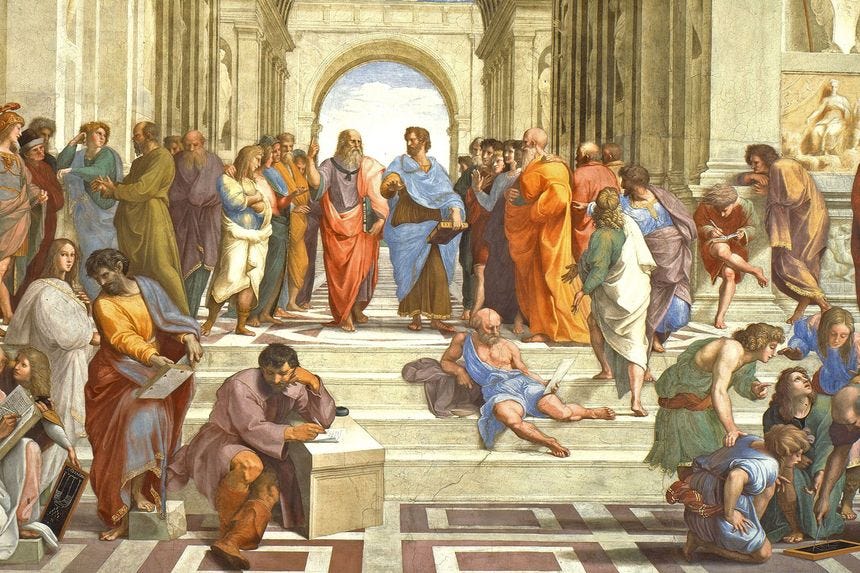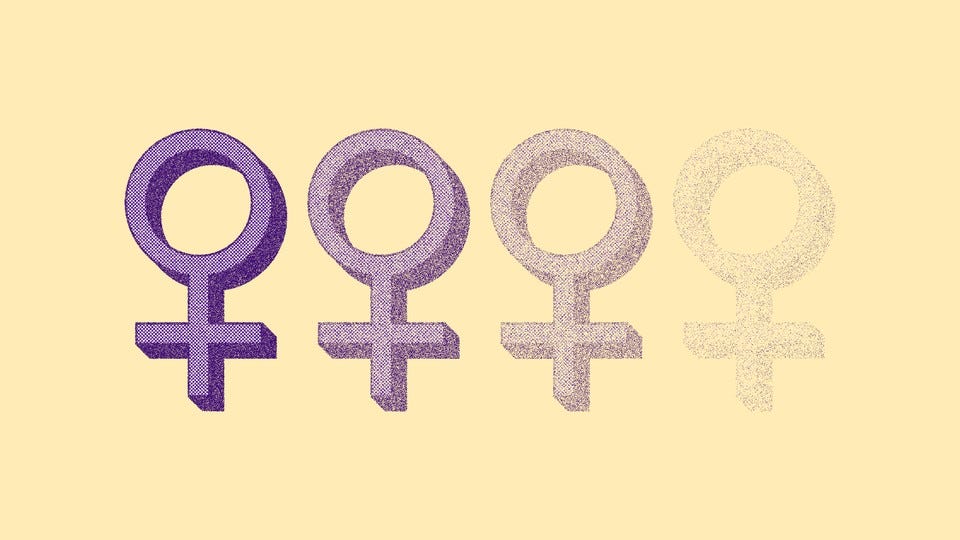Am I proud of my Whiteness?
On our Substack, FAIR Advisor John Wood Jr. analyzes the concept of “whiteness,” explaining how he has come to understand it and how it has affected his identity as a biracial man. Although the term is frequently criticized—particularly the versions of it that encompass things like liberalism and even “rational thinking”—Wood argues that whiteness as he defines it can help us to better understand America’s sordid history of racial oppression and how it has evolved over time. He concludes by reminding us that we can overcome the strictures of “whiteness” by treating others as unique individuals.
What matters more is that we see beyond the construct of whiteness to the more complicated and yet more hopeful realities of the full lived experience of Americans of all backgrounds. And as far as the people we call “white” are concerned, there have always been those among us, consciously and subconsciously, who have sought to transcend that false veneer in the name of greater humanist and religious ideals.
History is complicated. Let’s teach the complexity.
Also on our Substack, Christopher J. Ferguson discusses James Haley’s book Captive Paradise: A History of Hawaii and his admiration for “Haley’s refusal to misleadingly portray pre-contact Hawaii as an egalitarian utopia.” Ferguson compares Haley’s measured treatment of Hawaiian history to the now-fashionable practice of reducing the complexities of history to a myopic story of western countries (and specifically white males) conquering and oppressing the rest of the world.
Most of humanity’s greatest sins—slavery, genocide, wars of conquest, misogyny, racism, homophobia, and others—have never been unique to one culture or one group of people. By understanding that any culture is capable of both good and evil, by removing the simplistic “good guys versus bad guys” framework from most of history, we can understand our failings as failings common to our species. By acknowledging that we’re all human, with all of the strengths and weaknesses that entails, even the darker parts of our history can be a force for unity and healing, and can help us to ensure that we move forward into a better, common culture, together.
Nothing unites different marginalized groups: exposing the intersectional hoax
For Newsweek, FAIR Advisor Wilfred Reilly argues against the notion commonly-espoused by activists that all “marginalized groups”—non-white, homosexual, transgender, non-Christian, etc.—are natural political allies. “[T]his view is wholly unsupported by the data,” he writes, noting that
Not only do many "intersectional" Americans out-earn white men, but Black and Hispanic Americans often score as more homophobic than white Americans in polls, and some of the most contested terrain in modern discourse can be found between trans activists and gender critical lesbians.
Reilly also mentions other schisms within this allegedly unified intersectional movement, such as the overrepresentation of black Americans in anti-asian hate crimes. He ends by clarifying:
There is nothing inherently "good" or "bad" about the fact that large groups within society often disagree vigorously, even if they are not "supposed" to. But this plain reality does contradict a false narrative very prevalent among the intelligentsia today, which would have you believe that disparate minority groups somehow have a common struggle against a white supremacist majority that seeks to oppress them.
The Sinister Symmetry Of CRT And GRT
For his Substack, The Weekly Dish, FAIR Advisor Andrew Sullivan writes about the similarities between the key assumptions of critical race theory and the “great replacement theory,” the latter of which appears to have motivated the recent mass shooting in Buffalo, New York. Sullivan explains how, despite originating from opposite ends of the political spectrum, each of these ideas attack America’s “race-neutral, color-blind center ground.”
A liberalism that believes that racial identity is the core identity for an American, that “whiteness” is a definable American characteristic that needs to be “dismantled,” and that the central political struggle in the US is between older whites and younger non-whites, is a liberalism helpless in the face of white nationalism.
Not only does critical race theory leave us vulnerable to white nationalists, Sullivan writes. It actually helps to strengthen the appeal of white nationalists by legitimizing some of their most paranoid ideas, such as the belief that there is a cabal of powerful figures that are eager to “replace” white people with non-white immigrants.
If we are to get past the kind of ugly violence and race essentialism in Great Replacement Theory, then we also need an antidote to the toxins of Critical Race Theory. The two illiberalisms are profoundly connected. They need each other. And, in their racialized heart, they are morally exactly the same.
‘Racism’ Has Too Many Definitions. We Need Another Term.
For the The New York Times, FAIR Advisor John McWhorter weighs in on the mass-shooting in Buffalo, writing about how it highlights the need to distinguish between the racist ideology that fueled the Buffalo shooter, and the various disparities between racial groups that comprise what is commonly referred to as “systemic racism.”
[W]e increasingly apply the term [racism] in reference both to violent hate crimes and to the fact that, for example, in the aggregate, Black students don’t perform as well on standardized tests as some of their counterparts. But while we tend to use the term “racism” for both things, it isn’t readily obvious to most how both prejudice and a differential in performance are versions of the same thing, referred to with one word. One of the thorniest aspects of today’s race debate is that we have come to apply that word to a spread of phenomena so vast as to potentially confuse even the best-intended of people.
Buffalo and the Myth of Racist America
For Unherd, FAIR Advisor Ayaan Hirsi Ali also responds to the recent tragedy in Buffalo. For her, the mass-shooting—and even more so the reactions to it from many on the political left—shows the inability of “systemic racism” to convincingly explain the plight of black Americans today. For black Americans to succeed, she writes, they must reject the narrative that they are hopelessly trapped in a system of white supremacy, and instead embrace the freedom afforded them as Americans.
[C]ertain individuals are motivated by a loathing for black people. But this shouldn’t define us, let alone the country we live in. For black Americans to progress, we need to cast off today’s dependency on white guilt for recognition and support. What is the way forward if you accept that blacks in America are free? It is to have the courage to live that freedom. It means holding ourselves accountable for our behaviour. It means learning to shape our destiny regardless of skin colour. And it means ignoring the divisive rhetoric propagated by those such as Patrisse Cullors, Kamala Harris and Ibram X Kendi.
Rafael Sanzio da Urbino, ‘The School of Athens.’ GETTY IMAGES
Don’t Cancel the Classics, Broaden and Diversify Them
For the Wall Street Journal, Angel Adams Parham defends Classics Education against critics who charge that the Classics are inherently tied to white supremacy and rigid notions of hierarchy. She disagrees with these condemnations.
Excellence and diversity, however, can coexist with an education in the classics. The classics should be elevated and broadened, diversified through context and accumulated knowledge. And they have much to teach us, with a proven record of lifting the performance of students, especially the disadvantaged.
While Parham agrees with some critics that “the older forms of classical education weren’t perfect, the foundations were sound and provided a rich feast for debate and intellectual formation.” She discusses how many classics education programs today—including her own—build on these foundations to create a curriculum that includes thinkers from a diversity of backgrounds.
Graphic by Arne Bellstorf
What I want my kids to learn about American racism
For The New York Times, Eboo Patel writes about how learning concepts like “institutionalized racism” and “structures of oppression” in college helped him to understand his family’s experience growing up in America as South Asian Muslim immigrants. However, he also notes that, eventually, this ideology encouraged him to adopt a reductive and cynical worldview that made it impossible for him to appreciate the ways in which he was fortunate. “I was in a conspiracy against my own agency,” he writes.
I don’t want my kids to shy away from confronting racism, but I don’t want whatever racism they might experience to make them lose sight of all of their other identities and privileges. Above all, I want my two sons to understand that responsible citizenship in a diverse democracy is not principally about noticing what’s bad; it’s about constructing what’s good. You need to defeat the things you do not love by building the things you do.
The Abortion Debate is Suddenly about ‘People,’ not ‘Women.’
For The Atlantic, Helen Lewis criticizes progressive organizations like the ACLU for erasing the word “women” from their pro-choice advocacy, despite the fact that “99.9 percent of those who need abortions are women.”
One of the most irritating facets of this debate is that anyone like me who points out that it’s possible to provide abortion services to trans people without jettisoning everyday language such as women is accused of waging a culture war. No. We are noticing a culture war. A Great Unwomening is under way because American charities and political organizations survive by fundraising—and their most vocal donors don’t want to be charged with offenses against intersectionality.
For audio versions of our FAIR News and FAIR Weekly Roundup newsletters, subscribe and listen to FAIR News Weekly on Apple Podcasts, Spotify, Google Podcasts, or via RSS feed.
Join the FAIR Community
Become a FAIR volunteer or to join a FAIR chapter.
Join a Welcome to FAIR Zoom information session to learn more about our mission, or watch a previously recorded session in the Members section of www.fairforall.org.
Take the Pro-Human Pledge and help promote a common culture based on fairness, understanding, and humanity.
Join the FAIR community to connect and share information with other members.
Share your reviews and incident reports on our FAIR Transparency website.















I think you need to add an educational video to the wonderful group you already have: Jim Crow. I don't know how to explain that era to kids and I think they do need to know about it. Your treatment of it would be much appreciated.